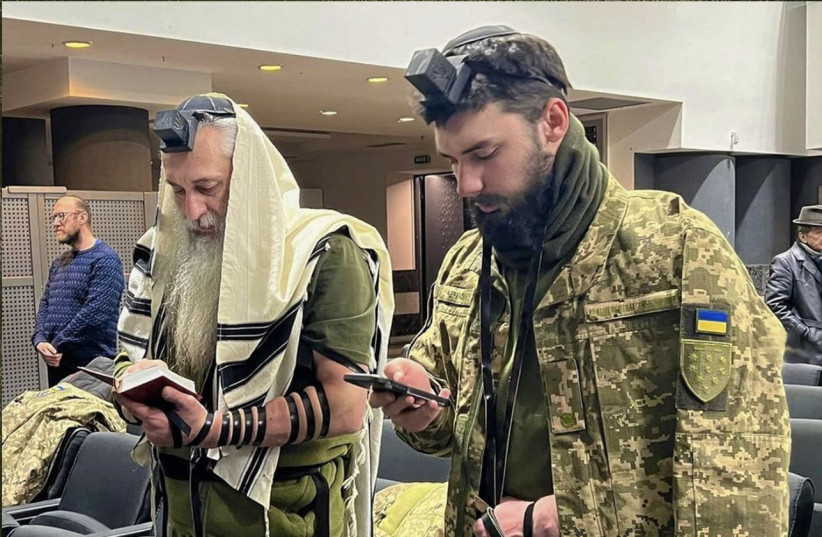Historically, the Jewish population of Ukraine has not had much reason to like Ukrainians. Pogroms were a frequent enough feature of imperial Russia and the Cossacks’ antisemitism was notorious. During World War II the Nazis murdered almost all Ukrainian Jews – often with the assistance of Ukrainian collaborators.
Survivors who returned to Ukraine after the war continued to experience considerable hatred; most left for Israel or the US when it became possible. Today, Jews in Ukraine make up only a fraction of 1% – compared to around 5% in the 1930s.
Since the start of the war in Ukraine, I have talked to many Ukrainian-born Jewish immigrants and to American Jews whose grandparents came from Ukraine. While supporting Ukraine against Putin’s aggression they remain clear-eyed about Ukraine’s antisemitic past.
And yet there are considerable similarities between the Ukrainian and the Jewish people.
What are the similarities?

Neither had an independent state in the modern era. Jews could point to their state that existed from the biblical times until the 1st century CE, and Ukrainians to medieval Rus, but their national states came about for the first time only in the 20th century. Before that they had only puppet entities under Soviet domination: the Ukrainian Soviet Socialist Republic and the misbegotten Jewish Autonomous Oblast in the Soviet Far East.
When the Jews finally got their state, it turned out that after two millennia of Diaspora the Jewish people are extremely diverse, ranging from blond German Jews to much darker Bukhara Jews and dark-skinned Ethiopian Jews – not to mention a substantial Arab minority. Ukraine, too, found within its borders a substantial ethnic Russian minority along with a variety of Hungarian, Romanian and Turkish speakers – as well as Crimean Tatars.
When I was growing up in the Soviet Union, Jewish martial prowess was the butt of dumb jokes as well as libelous accusations. Soviet Jews, claimed antisemites, spent World War II in the safety of Tashkent, leaving ethnic Russians to defend them against Hitler. These claims are made to this day, despite widely available statistics on the number of Soviet Jews who fought in the ranks of the Red Army, who were killed in action and who were decorated for heroism.
On the other hand, the myth that Jews couldn’t or wouldn’t fight was popped spectacularly in 1967, when Israel defeated three numerically superior armies armed with Soviet weaponry.
For many Russians it was a surprise but it shouldn’t have been. During the Russian civil war, many Jews distinguished themselves both as military strategists and on the battlefield. Leon Trotsky, the people’s commissar of military and naval affairs, built the Red Army and led it to victory.
Jewish military commanders were prominent in the USSR until the late 1930s, when high-ranking officers such as Iona Yakir, Yakov Gamarnik, Mikhail Sangursky, Boris Feldman, Lazar Aronshtam, Semyon Ventsov-Kranz, Abram Volpe and many others perished in Stalin’s purge of the armed forces.
Similarly, Russians have always held Ukrainians in contempt. They see them as slow-witted “younger brothers” speaking a funny language that they regard as a corrupted peasant dialect of the great Russian language. Ukrainians, you might hear in Russia, are good-natured and slow; they eat cured pig fat, drink a lot of vodka and are passive.
This dismissive attitude had a lot to do with Vladimir Putin’s expectations of a three-day victory when he invaded Ukraine in February. But Putin, who likes to give history lessons to everyone who would listen, demonstrates massive ignorance of actual Ukrainian history. The Ukrainian Partisan Army (UPA) fought valiantly for Ukrainian independence against Germans, Poles and Soviets and continued to resist well into the 1950s.
Soviet dissident Yuri Fedorov, who served a 15-year sentence for the 1970 attempt by a group of Soviet Jews to steal an airplane in Leningrad, describes Ukrainian nationalists as being among the most courageous, honest and decent people he ever met in Soviet labor camps.
Russian journalist Alexander Nevzorov observed Ukrainian volunteers fighting for Chechnya and came away full of admiration for their bravery and fighting skills. When Putin invaded Ukraine, Nevzorov was one of the very few observers to predict a Ukrainian victory from the start.
Israel
Israel is a nation born in adversity and melded together by war. It’s a war not so much to defend its independence as a battle for survival against an enemy that still harbors dreams of driving Israelis into the sea. Ukraine gained its independence peacefully, but since 2014 it too had to defend its national state by force of arms. Since February, it has been fighting an enemy whose declared aim is to erase the nation of Ukraine from the map.
Israel has built itself into a prosperous modern nation, but it is also a regional military superpower. Although it is periodically fighting regional skirmishes against non-state actors, no country has been inclined to test its willingness and ability to defend itself.
In Kyiv there is now talk that after Russian troops are driven off Ukrainian soil, Ukraine will need to emulate Israel in its relations with Russia: to build a formidable military and be ready to respond with overwhelming force to any future act of aggression.
